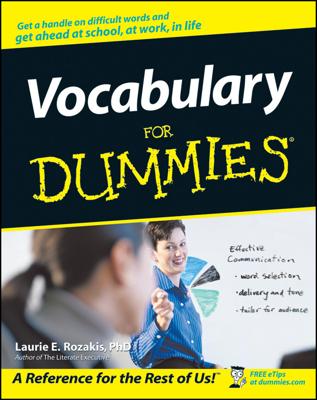In English, objective and subjective complements fill out your sentences. Objective complements aren’t major players in a sentence. They simply provide more detail about the object of a sentence. Subjective complements are important. They provide information about the subject of the sentence.
Objective complements in sentences
Here’s the deal: sometimes a direct object doesn’t get the whole job done. A little more information is needed (or just desired), and you don’t want to bother adding a whole new subject-verb pair. The solution? Use an objective complement — an added fact about the direct object.
The objective complement (italicized in the following sentences) may be a person, place, or thing. In other words, the objective complement may be a noun:
Eggworthy named Lester copy chief of the Heart Society Bulletin. (named = verb, Eggworthy = subject, Lester = direct object)
Gloria and others with her world view elected Roger president. (elected = verb, Gloria and others = subject, Roger = direct object)
Al called his dog Al-Too. (called = verb, Al = subject, dog = direct object)
The objective complement may also be a word that describes a noun. (A word that describes a noun is called an adjective.) Take a peek at these sample sentences:
Nancy considered her hazy at best. (considered = verb, Nancy = subject, her = direct object)
George dubbed Al-Too ridiculous. (dubbed = verb, George = subject, Al-Too = direct object)
Roger called George heartless. (called = verb, Roger = subject, George = direct object)
As you see, the objective complements in each of the sample sentences give the sentence an extra jolt. You know more with it than you do without it, but the objective complement is not a major player in the sentence.
Subjective complements in sentences
Subject complements are major players in sentences. A linking verb begins a word equation; it expresses a state of being, linking two ideas. The complement completes the equation. Because a complement following a linking verb expresses something about the subject of the sentence, it is called a subject complement. In each of the following sentences, the first idea is the subject, and the second idea (italicized) is the complement:
Nerdo is upset by the bankruptcy of the pocket-protector manufacturer. (Nerdo = upset)
Gloria was a cheerleader before the dog bite incident. (Gloria = cheerleader)
The little orange book will be sufficient for all your firework information needs. (book = sufficient)
It is I, the master of the universe. (It = I)
Subject complements can take several forms. Sometimes the subject complement is an adjective, for those of you who like the correct terminology. Sometimes the subject complement is a noun or a pronoun. The first sample sentence equates Nerdo with a description (the adjective upset).
The second sentence equates Gloria with a position (the noun cheerleader). In the third sample sentence, the subject book is described by the adjective sufficient. The last sentence equates the subject it with the pronoun I. Don’t worry about these distinctions. They don’t matter! As long as you can find the subject complement, you’re grasping the sentence structure.

